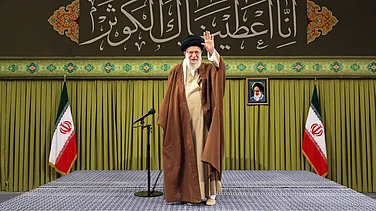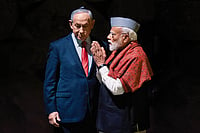They are the nowhere people. Myanmar’s Muslim Rohingyas are among the world’s most persecuted ethnic group with no place to call home. Killed, beaten and tortured, their women raped and their villages burnt down, Rohingyas were driven out of their traditional homeland in the Rakhine province. Fear for their lives drove them to abandon their home and flee to neighbouring countries to escape the periodic pogroms unleashed by the state.
Myanmar’s majority Buddhists are not ready to acknowledge them as their own, because they are Muslim and speak a dialect of Bengali. The Rohingyas have a distinct culture and tradition of their own and had lived for centuries in the Arakan hills. They were stripped of their citizenship in 1982 when residents were asked to provide documents to prove that their ancestors lived in Myanmar before 1948, the cut-off date under the new citizenship law introduced by the government. Most families, being poor and uneducated, had no papers to show their ownership of land or property. Just 40,000 Rohingya’s were granted citizenship. The rest were classed as illegal immigrants from Bangladesh.
The slow trek of Rohingyas out of the country began since the early 1970s but progressively as riots erupted, their numbers swelled. After two major attacks in 2012 and 2017, there was a general exodus out of Myanmar.
Some have fled to Thailand, others to India, Indonesia, Nepal, and a lucky few to the US and Europe, but the majority are in Bangladesh since 2017. About one million Rohingya refugees live in the largest refugee camp in the world in Cox’s Bazar, Bangladesh.
In the early years of the exodus from Myanmar, most Rohingyas came to India, a country with the tradition of welcoming refugees with open arms. But since 2014 when the BJP came to power, Rohingyas have had a tough time. They are no longer welcomed as the home ministry is concerned about Islamic militants and fear that hardcore militants could slip in with ordinary refugees and cause major security problems. There are around 16,000 Rohingyas registered with the United Nations High Commission for Refugees (UNHCR) living in India currently. The UNHCR gives them a small stipend each month. There are roughly around 40,000 Rohingya living in camps and settlements across Jammu, Haryana, Hyderabad, Delhi and Noida.
The condition of most Rohingyas living in India is pathetic. Moreover, times have changed and there is little sympathy for them from ordinary citizens. It was not so a few decades ago. Sri Lankan Tamils fleeing the fighting in the northern Jaffna area were warmly welcomed by people in both Tamil Nadu and Karnataka. The Centre and state governments were keen on making their lives comfortable. Afghan refugees who flocked to Delhi after President Najibullah was killed and the Mujahideen fighters took control of the country in the 1990s, were also welcomed. They mixed freely with the people and opened popular eating joints in the capital, especially around Lajpat Nagar.
But the picture is very different for the Rohingyas. Times have changed and so have public perception of refugees.
When Mohammad Salim arrived in India in 2012 after his village was attacked by a violent mob, he hoped to start a new life in this country.
Now 35, and the father of two young boys, his life remains as miserable. He sometimes wonders if escaping to India was the right decision. Salim lives in a makeshift refugee settlement a kilometer down the road from the Kalindi Kunj metro station. It is a squalid shack made of tarpaulin and wood. "We have no access to water or wash room facilities," says Salim, flipping open a dirty curtain to show the interior of his tiny dark hut. "We cook, clean, bath and pee in this area (yes all of it in that area)…This place is like a jail, the future for my boys is bleak."
Salim wipes the perspiration from his forehead and adds, "When it rains water from the road enters our basti (which is around 4 feet below the road level). Snakes too enter at times triggering panic among us. Heavy storms destroy the canvas and water enters from the top making it impossible to live inside our dingy shacks. "This is the plight of Mohammad Salim and the rest of the 250 people who live in this dirty squalid settlement. Now as if this was not enough the government has come up with a new rule, that we cannot leave this place no matter what emergency. If we do, police come in and begins questioning each family. All of us feel suffocated. This place is like jail for us. We are living a hopeless life here,” says Salim.
The horror stories are many. Over and above all this is the Government of India’s constant threat to deporting Rohingyas back to Myanmar.
“The Rohingyas are the most unwanted refugees in India without any protection. Because of the persecution, they effectively have to live surreptitiously in the most deplorable circumstances, as India’s policy on Rohingya refugees is only refoulment. Their numbers in India are unknown but surely less than the Chin and other ethnic Myanmarese refugees in India whose presence is tolerated by India,” says Suhas Chakma, director, Rights and Risks Analysis Group (RRAG), operating from New Delhi. Refoulement is the term used for the forcible return of refugees to a country where they are liable to be subject to persecution.
India has not signed the Refugee Convention, though morally New Delhi cannot justify sending Rohingyas back home where their lives are in danger.
Chakma explained that, “Refugees have no legal rights, the moment you enter the part of the country without visa you are charged with violation of Section 14 of the Foreigners Act because India doesn’t have any system for application for consideration of refugees. In this entire legal system, there’s no provision where somebody could seek refugee status.”
“The country’s ad-hoc policy means all refugees do not get the same treatment. Such decisions are taken based on geopolitical and political considerations of the state and national government,” says Chakma. He further adds, “It also depends on the person who is being deported. But if you are a Rohingya refugee in this atmosphere of the Hindu- Muslim divide, then you will be identified as potential security threat and be deported." He has long advocated a well-laid-out refugee policy for India.
(With inputs from Dhairya Kapur)



























